Seeds for Needs – India: a pathway to diversification
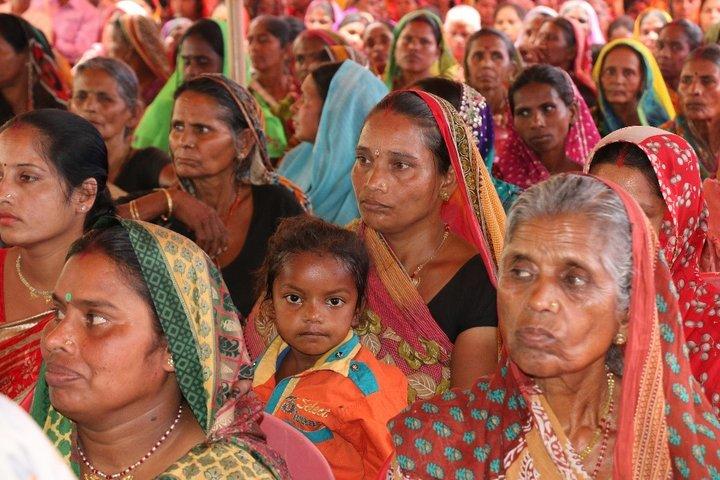
Bioversity International's 'Seeds for Needs' in India researches how crop diversity can help minimize the climate change risks with the support of more than 25,000 local farmers, six of whom shared their experience of the initiative.
Bioversity International's initiative 'Seeds for Needs' in India includes over 25,000 farmers, most of whom are resource poor and with small landholdings. Through the initiative, the farmers are exposed and have access to diverse crops and varieties that help them adapt to various climatic conditions, while assisting research on the mitigating effects of crop diversity on climate change. As a result, the participating farmers have witnessed a larger and a more stable production yield, with numerous other benefits. During the Farmers' Field Day held in March 2017 in Vaishali, Bihar, six farmers shared their positive experiences.
By Sonal Dsouza
'Seeds for Needs' is a Bioversity International initiative working with farmers to research how crop diversity can help minimize the risks associated with climate change. Seeds for Needs made humble beginnings in India, involving only 30 farmers in the Vaishali district of Bihar – a site identified for climate-smart agriculture under the CGIAR Research Programme on Climate Change, Agriculture and Food Security. Bihar farmers responded enthusiastically to the initiative, which hence expanded to other states. In India, Seeds for Needs now involves over 25,000 farmers from 600 villages of 49 districts in 7 states, where the majority of farmers are resource poor with small landholdings.
Through this initiative, farmers gain first-hand knowledge of different crops and varieties – including landraces – that can help them adapt to different climatic conditions. Until now, farmers have been exposed to nearly 50 varieties of rice and wheat, and have been involved in 46,000 participatory trials as 'citizen scientists'. Having better information and access to a wide range of varieties, allowed farmers to choose those best suited to their conditions, helping them to cope with unpredictable weather.
Farmers have also been trained on quality seed production and raising seedlings under protected net-house conditions.
A survey conducted in April 2017 in Bihar indicates that 83% of farmers in Samastipur, 95% in Chhapra and 95% in Vaishali districts want to grow the varieties evaluated in the participatory trials. Before the intervention, the farmers usually used only two to three varieties, but now they know more than ten varieties of rice and wheat, and their response to different climatic conditions.
Currently, we are also promoting crop diversification by providing seeds of legumes, cereals, oilseeds and vegetables.
Straight from farmers' mouth
Some of the farmers who have been a part of Seeds for Needs since 2011, shared their experiences at the Farmers' Field Day held at Vaishali in Bihar on 20 March 2017.
The dual advantage
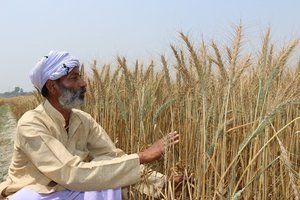 Horel Singh has been cultivating for 30 years and witnessing a lot of changes in the climate. Like other farmers in the area, he mainly grows wheat, rice and vegetables like bitter gourd, brinjal, jackfruit, cucumber, tomato, etc. He feels that the Seeds for Needs trials have helped him to realise the importance of different traits in varietal selection for local conditions.
Horel Singh has been cultivating for 30 years and witnessing a lot of changes in the climate. Like other farmers in the area, he mainly grows wheat, rice and vegetables like bitter gourd, brinjal, jackfruit, cucumber, tomato, etc. He feels that the Seeds for Needs trials have helped him to realise the importance of different traits in varietal selection for local conditions.
Based on his experience, he has made a selection from local wheat germplasm and is evaluating this germplasm with other varieties under participatory varietal selection trials. Horel said: "The selection has produced more than 72q/ha of wheat and 80q/ha of bhusa (fodder) during 2016-17 rabi season. The variety is highly tolerant to lodging due to its thick stem." Since livestock is an integral part of the farming system in Bihar, fodder-high and grain yielding varieties are preferred over varieties that have only high grain yield.
Lost wealth of diversity – a concern
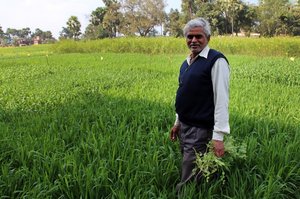 Jagdish Singh of Mukundpur village said: "I assess all the varieties and then select the better ones for use in the subsequent years." He used to purchase the seed from the market where often he could not find genetically pure seeds. "It is crucial to try new varieties to counter the effect of climate change we are facing," he adds.
Jagdish Singh of Mukundpur village said: "I assess all the varieties and then select the better ones for use in the subsequent years." He used to purchase the seed from the market where often he could not find genetically pure seeds. "It is crucial to try new varieties to counter the effect of climate change we are facing," he adds.
Jagdish has also diversified to growing mango trees. He shares concern that over the years, crops like sama (barnyard millet), marua (finger millet), kodo (millet) and arhar (pigeon pea) are not grown in the area anymore.
Making informed decisions
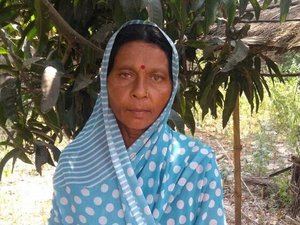 Nirmala Devi, a farmer with a landholding of an acre in Bhatadasi, says: "It is through Seeds for Needs that I learnt cultivation techniques like line sowing which led to more effective use of seeds and healthier growth of plants due to wider spacing."
Nirmala Devi, a farmer with a landholding of an acre in Bhatadasi, says: "It is through Seeds for Needs that I learnt cultivation techniques like line sowing which led to more effective use of seeds and healthier growth of plants due to wider spacing."
Before the trials, Nirmala knew about only two to three varieties available in the local market. She now has access to a basket of varieties and can choose the ones that are best suited to her fields. Currently, she grows five wheat varieties on her farm and would like to attend training on seed production.
Varietal diversity - the more the merrier
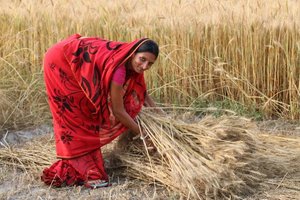 Leena Devi, Bhatadasi village, manages farming all by herself and it was her own decision to join the programme. Her husband and family members are very happy with her participation since the increased yield has led to better income and more fodder for cattle. "Earlier, varieties of rice that I grew gave better yield only if there were good rains. However, varieties provided in the trials perform well even under less rains," says Leena Devi.
Leena Devi, Bhatadasi village, manages farming all by herself and it was her own decision to join the programme. Her husband and family members are very happy with her participation since the increased yield has led to better income and more fodder for cattle. "Earlier, varieties of rice that I grew gave better yield only if there were good rains. However, varieties provided in the trials perform well even under less rains," says Leena Devi.
Before joining Seeds for Needs, she was growing only two varieties but now she is growing ten as she feels that this will minimise her losses. In the future, she would like to receive seeds of mung bean and vegetables.
Knowledge shared is knowledge multiplied
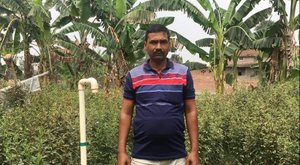 Ravinder Rai of Panapur village accepted 11 out of the 14 rice varieties provided by the programme. He feels that thanks to these varieties, lodging problems no longer exist. Moreover, he harvests more fodder for his cattle. "These varieties are ideal for cultivation when there are erratic changes in weather,' emphasises Ravinder.
Ravinder Rai of Panapur village accepted 11 out of the 14 rice varieties provided by the programme. He feels that thanks to these varieties, lodging problems no longer exist. Moreover, he harvests more fodder for his cattle. "These varieties are ideal for cultivation when there are erratic changes in weather,' emphasises Ravinder.
He has learnt that it is imperative to grow more varieties so that even if few fail, all is not lost. He says, "This programme has helped me to minimise my losses and moreover led to a 40-50% yield increase."Being a progressive farmer, he has provided seeds of selected varieties to many farmers in his village. "Knowledge needs to be shared," he concludes.
From reluctance to acceptance
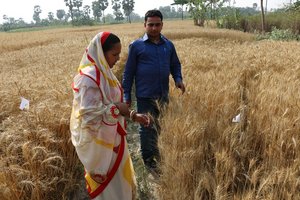 Sanjeev Kumar, the field staff of Bioversity International reminisces how farmers were initially reluctant to join the programme. Once the more informed and progressive farmers joined, others followed.
Sanjeev Kumar, the field staff of Bioversity International reminisces how farmers were initially reluctant to join the programme. Once the more informed and progressive farmers joined, others followed.
According to him, farmers were unaware of the varietal diversity existing in wheat and rice. For instance, most of the farmers were growing only PB-343 wheat variety but through the trials, they were introduced to more than 20 varieties, such as HD 2733, HD 2967 and DPW 621-50, and have become popular among the farmers.
_______________
Additional Information:
This is work is being carried out through Bioversity International's Effective Genetic Resources Conservation and Use Initiative. It contributes to the CGIAR Research Program on Climate Change, Agriculture and Food Security and is supported by CGIAR Fund Donors.
Seeds for Needs-India is coordinated by Bioversity International scientists Neeraj Sharma, Arnab Gupta and NK Krishna Kumar.
Photos top to bottom:
Photo 1: Women farmers at Farmers' Field Day at Vaishali, Bihar in April 2017. Credit: Bioversity International/S. Dsouza
Photo 2: Horel Singh, farmer from Rajapakar, Vaishali, Bihar. Credit: Bioversity International/S. Dsouza
Photo 3: Jagdish Singh, farmer from Mukundpur, Bihar. Credit: Bioversity International/P. Quek
Photo 4: Nirmala Devi, farmer from Bhatadasi, Bihar. Credit: Bioversity International/S. Kumar
Photo 5: Leena Devi, farmer from Bhatadasi, Bihar. Credit: Bioversity International/S. Dsouza
Photo 6: Ravinder Rai, farmer from Panapur, Bihar. Credit: Bioversity International/S. Dsouza
Photo 7: Bioversity field staff monitoring the trials. Credit: Bioversity International/N. Sharma
